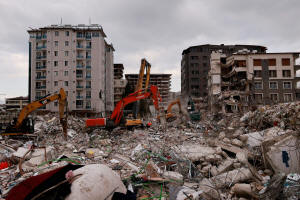Turkey offers economic support in earthquake zone
 Send a link to a friend
Send a link to a friend
 [February 22, 2023]
By Ali Kucukgocmen and Henriette Chacar [February 22, 2023]
By Ali Kucukgocmen and Henriette Chacar
ANTAKYA, Turkey (Reuters) - Turkey has launched a temporary wage support
scheme and banned layoffs in 10 cities on Wednesday to protect workers
and businesses from the financial impact of the massive earthquakes that
hit the south of the country earlier this month.
A 7.8 magnitude earthquake on Feb. 6 killed more than 47,000 people,
damaged or destroyed hundreds of thousands of buildings in Turkey and
Syria and left millions homeless.
In Turkey, 865,000 people are living in tents and 23,500 in containers,
while 376,000 are in student dormitories and public guesthouses outside
the earthquake zone, President Tayyip Erdogan said on Tuesday.
Under Ankara's new economic relief plan , employers whose workplaces
were "heavily or moderately damaged" would benefit from support to
partially cover wages of workers whose hours had been cut, the country's
Official Gazette said on Wednesday.
A ban on layoffs was also introduced in 10 earthquake-hit provinces
covered by a state of emergency.
Business groups and economists have said the earthquake could cost
Ankara up to $100 billion to rebuild housing and infrastructure, and
shave one to two percentage points off economic growth this year.

Erdogan has promised a swift reconstruction effort, although experts say
it could be a recipe for another disaster if safety steps are sacrificed
in the race to rebuild.
Six people were killed in the latest earthquake to strike the border
region of Turkey and Syria, authorities said on Tuesday.
[to top of second column]
|

Workers clean the rubble of a collapsed
building in the aftermath of a deadly earthquake in Antakya, Hatay
province, Turkey, February 21, 2023. REUTERS/Thaier Al-Sudani

It was followed by 90 aftershocks, Turkey's Disaster and Emergency
Management Authority (AFAD) said, adding fresh trauma to Antakya
residents left homeless by the previous earthquake.
In power for two decades, Erdogan faces presidential and
parliamentary elections in May, although the disaster could prompt a
delay in the vote.
Even before the quakes, opinion polls showed he was under pressure
from a cost of living crisis, which could worsen as the disaster has
disrupted agricultural production.
Moves by the government to control information around the earthquake
have been met with public anger.
Turkey's internet authority blocked access to a popular online
forum, Eksi Sozluk, on Tuesday, two weeks after it briefly blocked
access to Twitter, citing the spread of disinformation.
Information Technologies and Communications Authority (BTK) website
shows the website was blocked late on Tuesday, without citing any
explicit reason. Turkish police last week arresteddozens of people
accused of creating fear and panic by "sharing provocative posts"
about the earthquake on social media.
(Additional reporting by Huseyin Hayatsever in Ankara, Writing by
Michael Georgy, Editing by Raissa Kasolowsky)
[© 2023 Thomson Reuters. All rights
reserved.]This material may not be published,
broadcast, rewritten or redistributed.
Thompson Reuters is solely responsible for this content. |